Suchergebnisse
Ergebnisband „Urbane Wärme und Kälte“
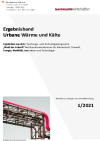
Der vorliegende Ergebnisband stellt abgeschlossene Projekte aus dem Forschungs- und Technologieprogramm „Stadt der Zukunft“ des Bundesministeriums für Klimaschutz, Umwelt, Energie, Mobilität, Innovation und Technologie (BMK) im Bereich Urbane Wärme und Kälte vor. Die gewonnenen Erkenntnisse sollen eine Entwicklung in Richtung energieeffiziente und klimaverträgliche Stadt unterstützen, die auch dazu beiträgt, die Lebensqualität und die wirtschaftliche Standortattraktivität zu erhöhen.
Schriftenreihe
1/2021
Redaktionelle Gestaltung: Bianca Pfefferer, Hannes Warmuth (ÖGUT)
Herausgeber: BMK
Deutsch, 24 Seiten
Downloads zur Publikation
Grüne und resiliente Stadt - Steuerungs- und Planungsinstrumente für eine klimasensible Stadtentwicklung
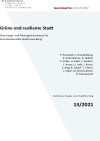
Ziel des Projekts war ein „Proof of Concept“ eines Regelkreises und Tool-Sets zur Steuerung, Optimierung und Evaluierung einer grünen und klimasensiblen Stadt(teil)planung bestehend aus städtebaulichen und freiraumplanerischen Instrumenten sowie Klimasimulationen auf unterschiedlichen Maßstabsebene.
Schriftenreihe
13/2021
F. Reinwald, C. Brandenburg, P. Hinterkörner, B. Hollósi, C. Huber, A. Kainz, J. Kastner, F. Kraus, U. Liebl, J. Preiss, Z. Ring, B. Scharf, T. Tötzer, J. Züger, M. Žuvela-Aloise, D. Damyanovic
Herausgeber: BMK
Deutsch, 124 Seiten
Downloads zur Publikation
Green SandboxBuilder: Regulatory Sandboxes im Bereich des nachhaltigen Bauens und Sanierens
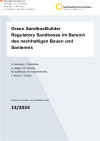
Im Projekt "Green SandboxBuilder" wurde erstmals in Österreich der Bedarf an Regulatory Sandboxes für ökologisch nachhaltige und klimawirksame Vorhaben im Baubereich systematisch erhoben. Die Umsetzung von Regulatory Sandboxes im österreichischen Bausektor kann dazu beitragen, die Einführung von technologischen, prozessualen und sozialen Innovationen entscheidend zu beschleunigen und somit die Nachhaltigkeitsziele zu erreichen.
Schriftenreihe
13/2024
G. Leimüller, J. Rohrhofer, A. Gerger, Ch. Schranz, M. Aichholzer, M. Schachenhofer, C. Benes, F. Ozclon
Herausgeber: BMK
Deutsch, 71 Seiten
Downloads zur Publikation
BIMaterial Process Design for Material Building Pass
Building Information Modelling supported compilation of a Material Building Pass; as a qualitative and quantitative documentation of the material composition of, and the material distribution within, a building structure. This project is a central milestone towards standardized, BIM-generated building material passes.
Digitale Transformation der österreichischen Bauwirtschaft und Auswirkungen auf die Erwerbstätigen
In einer Trendanalyse werden wahrscheinliche Auswirkungen der digitalen Transformation in der österreichischen Bauwirtschaft auf den Branchen-Arbeitsmarkt untersucht. Auf Basis von Feedback von BranchenexpertInnen wird für die kommenden fünf bis zehn Jahre analysiert, für welche Berufsgruppen digitalisierungsinduzierte Effekte eher zu einer steigenden vs. sinkenden Arbeitskraftnachfrage führen.
Smart Cities Summerschool - 4 Public Lectures
23., 25. und 27. August 2016
Wien (verschiedene Locations)
Im Rahmen der Summer School "Smart Cities – Designing Places & Urban Mentalities" öffnen vier Public Lectures der breiten Öffentlichkeit das Spannungsfeld zwischen interdisziplinärer Kooperation und wissenschaftlichem Austausch in den Bereichen Stadtplanung, Soziologie, technologiegetriebener Innovation und Informatik.
SPRINKLE - Smart City Governanceprozesse in kleinen und mittleren Städten
Das Projekt "SPRINKLE" führte eine umfassende Untersuchung der Ansätze für die Koordination und Steuerung einer Smart City Entwicklung in kleineren und mittleren Städten durch. Dabei wurden im Rahmen von Fallstudien für ausgewählte energiebezogene städtische Handlungsfelder sowohl relevante rechtlich-institutionelle Rahmenbedingungen als auch Governance-Prozesse betrachtet.
HEDWIG - Erhebung von Mess-Daten zur Wirkungsabschätzung von begrünten Gebäuden
HEDWIG verfolgt die Erfassung und Einschätzung der Wirkung von Grünfassaden und -dächern an Gebäuden anhand von Mikroklima- und bauphysikalisch relevanten Daten aus Dauermessungen. Ziel ist die Definition fundierter Vegetationsparameter und Leistungskennwerte auf Innen-, Außen- sowie mikroklimatisch relevanter Stadtraumebene. Es werden Standardkennwerte sowie ein Ablaufschema für standardisierbare Auswertungsverfahren vorliegen.
Monitoring und Evaluierung von städtischen Energieflüssen
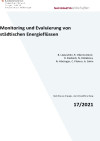
Ausgangsbasis für das Projekt sind die Energiestatistiken. In einem ersten Schritt wird die Erhebungsmethodik im Detail analysiert. Basierend auf den Erkenntnissen der Analyse wird eine Methodik zur Erstellung städtischer Energieflüsse erstellt. Diese wird mithilfe des zu entwickelnden Planungsinstruments "Senflusk" an 5 Referenzstädten getestet.
Schriftenreihe
17/2021
B. Lepuschitz, R. Obernosterer, H. Daxbeck, N. Kisliakova, N. Hörzinger, C. Ploiner, A. Sahin Berichte aus Energie- und Umweltforschung 17/
Herausgeber: BMK
Deutsch, 65 Seiten
Downloads zur Publikation
scaleFLEX - Scalable method for optimizing the energy flexibility of districts
Development of a decentrally organized automation method for improving the demand-side flexibility options of buildings and districts. The utilized data-driven algorithm promise high scalability and therefore low installation and operating costs. The developed method will be validated using different building types (high-tech office buildings, low-tech office buildings, residential buildings).
Sondierung für die Entwicklung von moosbewachsenen Gebäudefassadenpaneelen (BE-MO-FA)
Sondierung für die Entwicklung von moosbewachsenen Fassadenpaneelen durch Auswahl und Erprobung von geeigneten Moosarten, neuen Feuchtespeicher- und Haftsubstraten, Materialien für Tragpaneele und hochbautechnischen Konstruktionsdetails Für ganzjährig grüne, dauerhafte, pflegeextensive und kostengünstige Gebäudefassaden.
3D*3B - 3D-Betondruck und Bewehrung für emissionsarme biegebeanspruchte Tragstrukturen des Hochbaus
Interdisziplinäres Projekt zur Integration von 3D-Betondruckelementen in vorwiegend biegebeanspruchte Tragstrukturen mit dem Ziel der nachweisbaren Reduktion von klimarelevanten Emissionen im Baubereich. Die Ergebnisse dienen der umfassenden Beurteilung technischer, logistischer und klimarelevanter Aspekte.
PRoBateS - Potenziale im Raumordnungs- und Baurecht für energetisch nachhaltige Stadtstrukturen
Das Projekt hat das Ziel, Hemmnisse und Potenziale für energiepolitische Maßnahmen im Raumordnungs- und Baurecht zu analysieren und konkrete Handlungsempfehlungen für energetisch nachhaltige Stadtstrukturen zu erarbeiten. Das Projekt verknüpft dazu eine fundierte rechtswissenschaftliche Analyse mit einer raumstrukturellen und quantitativen Wirkungsabschätzung.
SeasonalGridStorage - Innovative seasonale thermal storages for urban district heating grids
Sensible storages, which are currently used in district heating networks for seasonal storage of excess heat (e.g. from solar thermal or industrial waste heat), exhibit high space demand, investment costs and heat losses. Within this project, concepts for using innovative storage technologies, e.g. thermochemical storages (TCS) having high heat densities and enabling pressure- and lossless storage, were developed and analyzed on a technological, economic and ecological basis. Additionally, the regulatory framework has been evaluated.
see-it - Camera based, user centric daylight control system for optimized working conditions
In the project technologies in the field of building construction and building automation are being researched for quality and performance improvements in the workplace. The aim is to individualize the control of sun protection to the people who need to be protected from glare and overheating and hope to see through.
StromBIZ - Demonstrationsprojekte: Geschäftsmodelle dezentrale Stromerzeugung und Distribution
Ein "Tipping Point" bei der Umsetzung der Energiewende sind Geschäftsmodelle zur Vor-Ort-Nutzung von regenerativ erzeugtem Strom. Es wurden anhand von mehreren Demonstrations-PV-Anlagen auf Wohn- und Nichtwohngebäuden neue Geschäftsmodelle der dezentralen Stromerzeugung und Distribution entwickelt, implementiert, getestet und schließlich kommuniziert.
Eco.District.Heat - Potentials and restrictions of grid-bound heating systems of urban areas
Aim of the project Eco.District.Heat is to provide strategic decision-making support that enables Austrian towns and cities to deal with aspects of grid-bound heating (and cooling) systems in accordance with integrated spatial and energy planning from a holistic perspective when elaborating urban energy concepts.
SMARTIES - SMART Innovative Energy Services - Analysis of requirements of smart energy-services
The emerging development of smart grids provides market opportunities for new ICT-based services ("smart value-added services"). Economic and organizational barriers are foreseeable that could affect the establishment of business models and service providers (data formats, connectivity, controllability, etc.). In order to improve the chances especially for new and local actors, SMARTIES proactively tries to eliminate hindrances of innovation.
Smart Services für ressourcenoptimierte urbane Energiesysteme von Stadtteilen
Das Konzept einer Smart City referenziert explizit auf eine nachhaltige Stadtentwicklung. Praxisrelevante und gewinnorientierte Geschäfts¬modelle (Smart Services), die gleichzeitig auch einen gesellschaftlichen und ökologischen Nutzen stiften, werden entwickelt. Die Smart Services wurden für den konkreten Anwendungsfall in drei österreichischen Stadtentwicklungsgebieten erarbeitet und in einem umfassenden Stakeholder-Prozess im Hinblick auf ihre Praxistauglichkeit überprüft.
Innovations for the city of tomorrow
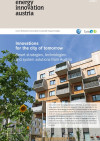
Smart strategies, technologies and system solutions from Austria
energy innovation austria
4/2016
Herausgeber: BMVIT und Klima- und Energiefonds
Englisch, 16 Seiten
